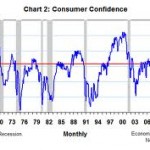Recently I wrote about the continuum of hope, fantasy and delusion within the context of playing the lottery. I realize now that I forgot to consider confidence, that extra added ingredient that can reset the continuum to the right or left. For example, supreme confidence can turn fantasy into hope and delusion into fantasy. Confidence is born somewhere in the depths of that seething black box we call the brain, and it is a gift that we can bestow upon ourselves, other individuals or institutions.
Self-confidence, like hope, is a key factor in helping us all get out of bed in the morning, and from day one, the role of parents is to foster self-confidence in their children. One strategy is to identify that thing that the kid will be good at, and parents with wherewithall can madly throw opportunities at their child, hoping one will stick and become a core part of the child’s identity – soccer is a frequent starting point to determine whether sports is an option, there are miniature violin lessons, art lessons, tae kwon do lessons, chess lessons, dance class – it is a mad dash to find something to build confidence around. But confidence is such a slippery thing – after careful nurturing it can totally implode with the slightest provocation. You only have to watch individual sports, like singles tennis or golf to witness a vanishing act. I was just watching a single ladies tennis match between Li Na and Maria Sharapova. Li Na won the first set and was up 4-0 in the second set, and suddenly without warning her confidence evaporated and she lost the next 7 games. Maria was cruising 3-0 in the final third set, and then Li Na sucked it up and got back into the game. Maria finally prevailed in a third set tiebreaker. One hallmark of coaching prowess is consistency over time, and consistency is based on confidence. It must drive coaches batty trying to unravel the enduring mystery of the mental game.
Confidence in another person is just as ephemeral – one or two little incidents can queer a relationship. A missed block in football, an empty promise, or a moment of self-serving dissembling can have lasting effects – the normally tight spiral flutters as the quarterback imagines an oncoming 350 pound behemoth, there is a hair trigger on a Plan B, and routine explanations are now fact-checked. And then there is confidence in the workplace, especially in your boss. I have learned that this is a rare thing that must be cherished – a boss who has confidence in his team, who provides them opportunities to do what they do best, and then shares any credit for success. I got lucky in one of my first jobs, but have found it tough going since then, and after being thrown under the bus a couple of times, I ultimately decided that self-employment was the best option.
Confidence in an institution is the bedrock of democracy, and like other examples, is hard to win and easy to lose. Let’s look at our military. I still remember the failed 1980 air raid to recapture the American hostages held in Iran, called Operation Eagle Claw. Helicopters flailed around in a sandstorm at the staging area, one ran into another and blew up, and the mission was aborted before even getting to Teheran. Somehow I wasn’t surprised and thought, wow, I guess that there is some truth to the military expressions SNAFU (situation normal all f***** up), FUBAR (f***** up beyond all recognition) and SUSFU (situation unchanged, still f***** up) But while I lack confidence in the military as an institution, I do have utmost confidence in individual soldiers. For our anniversary, I got my husband an autobiography called American Sniper, primarily because I am convinced that Nick would make an excellent sniper due to his birdwatching skills in detecting the slightest movement at great distances. Chris Kyle is celebrated as the most lethal sniper in US military history, tallying 150 “official” kills, smashing the previous record of 109. He cheerfully describes kill after kill, and proudly notes that he is so accurate in nailing the target “T zone (i.e. head and neck) that the insurgents “die before they hit the ground, and feel no pain.” He may be a killing machine, but I have minimal confidence that the stifling military bureaucracy has put him on the correct rooftop, or behind the correct bush. Similarly, I have total confidence that US SEAL Team 6 can successfully storm a compound in Abottabod, Pakistan, but more limited confidence that the CIA identified the right house – after all the whole weapons of mass destruction thing in Iraq was a total TARFU (totally and royally f***** up). So it was great relief to learn that we dodged a BOHICA (bend over, here it comes again) moment when Osama bin Laden was indeed inside and swiftly disposed of.
US military history, tallying 150 “official” kills, smashing the previous record of 109. He cheerfully describes kill after kill, and proudly notes that he is so accurate in nailing the target “T zone (i.e. head and neck) that the insurgents “die before they hit the ground, and feel no pain.” He may be a killing machine, but I have minimal confidence that the stifling military bureaucracy has put him on the correct rooftop, or behind the correct bush. Similarly, I have total confidence that US SEAL Team 6 can successfully storm a compound in Abottabod, Pakistan, but more limited confidence that the CIA identified the right house – after all the whole weapons of mass destruction thing in Iraq was a total TARFU (totally and royally f***** up). So it was great relief to learn that we dodged a BOHICA (bend over, here it comes again) moment when Osama bin Laden was indeed inside and swiftly disposed of.
On the domestic front, it turns out that our government is very interested in our own confidence – specifically our confidence as consumers, since an economy can only be healthy if it’s growing and we are spending money. Economists are great at crunching numbers and making projections, but they cannot capture the spending habits of our elusive “animal spirits,” a term coined by the economist John Maynard Keynes. The methods for assessing consumer confidence don’t strike me as particularly scientific – pollsters just call some 5,000 households on a monthly basis and ask random people four or five questions. All of the responses are collected and massaged a bit, and out spits a  number that is then compared to a number from the previous month. While consumer confidence may help set the government’s economic policy, a positive number can go viral. A news report of improving confidence might just boost my confidence – motivating me to buy an extra pint of raspberries at the farmer’s market and not care if they go moldy, and then I may bump into a neighbor at the market who finally bought that hybrid she wanted when she landed a better job, and her confidence might encourage me to buy a scooter so that I can go to the farmer’s market and buy a baguette and feel very French, and just maybe, if my animal spirits are particularly restless, I might go to France itself. The trickle down effect of confidence. But then there is the issue of our rusty old mailbox. In a childish display of petulance, we refuse to replace it primarily to annoy our very fussy and demanding neighbors whose gleaming wrought iron mailbox contrasts with our raggedy and rickety one. Visually, we may be bringing our neighborhood down. But I wonder if the neighbors think that budget constraints are the reason we have not upgraded our mailbox. Is our childish behavior subtly undermining our neighborhood’s consumer confidence?
number that is then compared to a number from the previous month. While consumer confidence may help set the government’s economic policy, a positive number can go viral. A news report of improving confidence might just boost my confidence – motivating me to buy an extra pint of raspberries at the farmer’s market and not care if they go moldy, and then I may bump into a neighbor at the market who finally bought that hybrid she wanted when she landed a better job, and her confidence might encourage me to buy a scooter so that I can go to the farmer’s market and buy a baguette and feel very French, and just maybe, if my animal spirits are particularly restless, I might go to France itself. The trickle down effect of confidence. But then there is the issue of our rusty old mailbox. In a childish display of petulance, we refuse to replace it primarily to annoy our very fussy and demanding neighbors whose gleaming wrought iron mailbox contrasts with our raggedy and rickety one. Visually, we may be bringing our neighborhood down. But I wonder if the neighbors think that budget constraints are the reason we have not upgraded our mailbox. Is our childish behavior subtly undermining our neighborhood’s consumer confidence?
There are a couple of different surveys that claim to assess consumer confidence. I think that the surveys are really asking whether or not we have confidence in the government to manage the economy. Can a bureaucracy apply a deft touch to hit that sweet spot between irrational exuberance and recession, and do it in an equitable way such that protestors don’t descend on Wall Street snarling at sleek bankers slinking around in chauffeured cars? But these questions would just be too pointed, so instead the surveys ask about such things as job prospects or whether or not you are thinking about upgrading your appliances. I would love to be one of the random participants in such a survey – to be part of the pulse of the American economy. But I would be the pollster’s worst nightmare. The polls limit your answers to three categories, i.e. better/worse/the same – that eliminate any kind of thoughtful or nuanced response. ABC News and Money magazine publishes the “Consumer Comfort Index.” One of the questions they would ask me is:
“Considering the cost of things today and your own personal finances would you say now is an excellent time, a good time, a not so good time or a poor time to buy the things you want and need?”
Now presumably the pollsters have slaved over this survey, choosing each word very carefully so that everyone is essentially answering the same question. But the first question that I would ask the interviewer is to explain the difference between what I want and what I need. From my point of view, this is the most fundamental question that must be addressed by anyone who contributes to the big splat of the affluent American carbon footprint. Wants and needs lie on a continuum with an individual and shifting dividing line between the two, a line that may in fact reflect consumer confidence. What I think I “need” may be an extravagant “want” to someone who is struggling to get by. And if I am trying to be a responsible steward of this dear planet, I should reset my line and convert some of my “needs” to more optional “wants.” For example, I just don’t need out-of-season raspberries flown here fromChile, and I can be equally French by riding my bike to the farmer’s market with a baguette sticking out of the pannier. But by now, the interviewer would have hung up in exasperation – the government doesn’t really care how I self-identify needs and wants, it just hoping that I am going to be a patriotic American and spend some money.
The missing words in the following poem are anagrams (i.e. share the same letters like spot, post, stop) and the number of asterisks indicates the number of letters. Your job is to solve the missing words based on the above rules and the context of the poem. Scroll down for answers.
The Feds wants our spending habits and economic policies optimally *******
So they use telephone surveys to probe our confidence and overall state of mind.
Are you going to buy a new car, a flat screen TV, or perhaps a diamond for your wife?
If so, these might be ******* indicators of an economy showing signs of life.
A healthy economy requires us to spend money on wants and needs for it to grow
But if we all decide that less is more – are we ******* the economy lethal blow?
*
*
*
*
*
*
*
*
Answers: aligned, leading, dealing
Follow Liza Blue on:Share:

